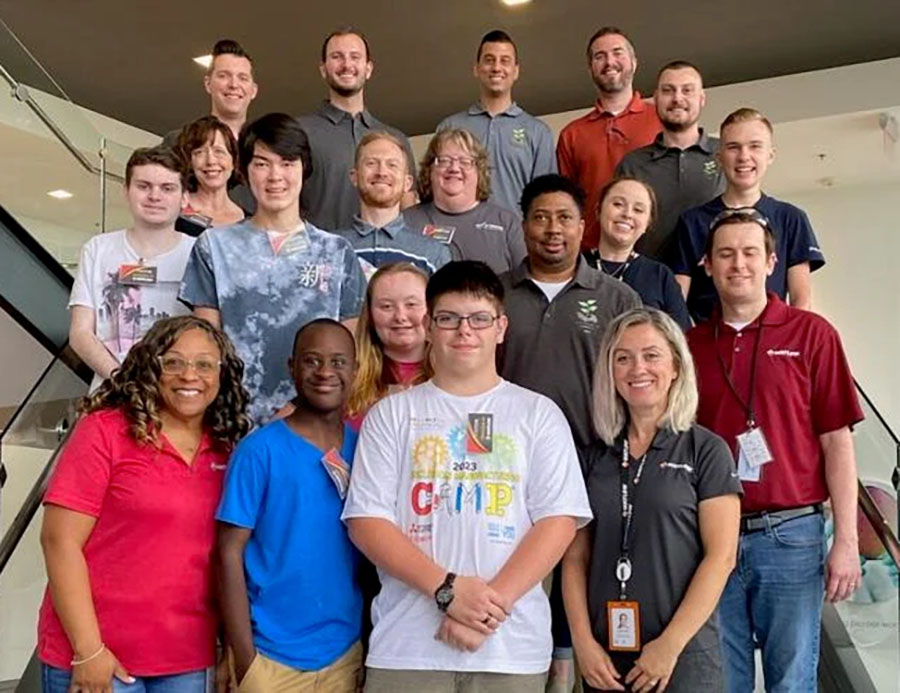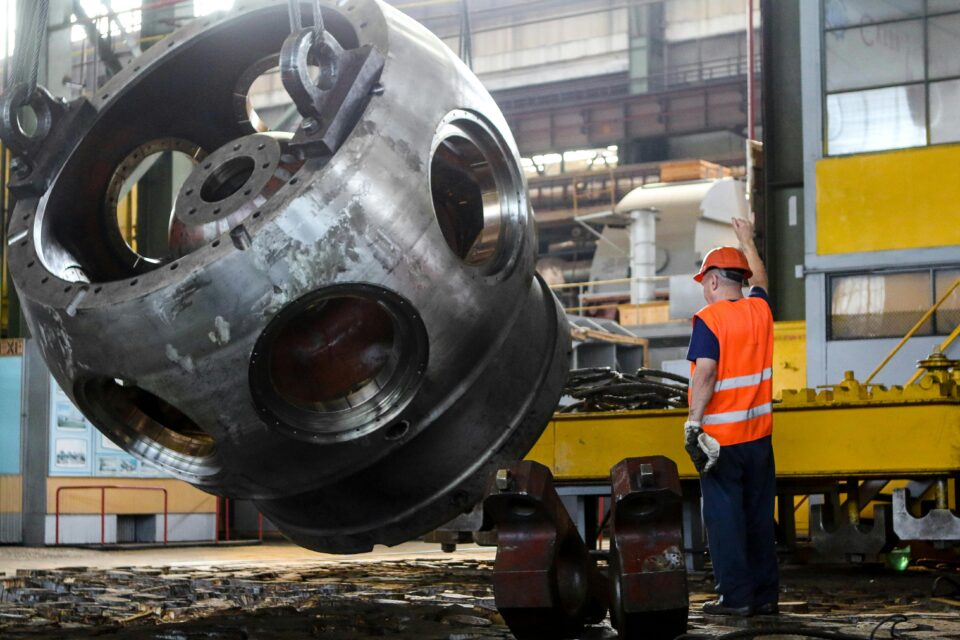By Robin Seaton Jefferson Jul 14, 2023 Updated Jul 14, 2023
“It’s Friday, and we’re changing lives. So, it’s a good day.”
Such simple but powerful words from Matt Jannings, chief program officer of competitive employment at Boone Center, Inc. (BCI). Jannings’ remarks came at the completion of BCI’s Inclusion Manufacturing Camp for high school students with disabilities on July 7.
Through its organizational, competitive and vocational training programs, BCI helps people with intellectual and developmental disabilities find jobs they love. Now, for the first time in the organization’s 64-year history, the nonprofit offered a free four-week summer camp for high school freshmen and sophomores who are interested in manufacturing. The camp was possible because of a grant from Nuts, Bolts and Thingamajigs (NBT), the foundation of the Fabricators & Manufacturers Association, International (FMA).
Through its Inclusion Manufacturing Camps and other programs, NBT works to keep manufacturing in America vital and the industry’s pipeline of skilled workers full. The camp and programs prepare young people to enter manufacturing and keep pace with technological advances. The organization works with partner organizations, schools, social service agencies, manufacturers and other employers to develop job readiness and skills training programs that serve young adults with special needs or disabilities. The FMA foundation provides funding and support to organizations like BCI that will deliver soft and hard skills curricula and practical work experiences to prepare young people for employment in the manufacturing space.
The 19-day camp at BCI ran weekdays from June 12-July 7 from 8 a.m.-noon at BCI’s St. Peters campus. Campers spent eight full days offsite visiting local, best-in-class manufacturing firms, including True Manufacturing, Natoli Engineering, Permian Plastics, Newco, Toyota Bodine, Cambridge Air Solutions, National Cart, Watlow and Beltservice Corporation.
“This is an experience they could never replicate in the classroom,” said Jannings. “I want these young people to get engaged. I asked myself, ‘Did we really give them something meaningful to do?’”
Six students, ages 15 to 19, from high schools across St. Charles and St. Louis counties, graduated the camp that featured instructor-led learning and hands-on activities including the construction of a capstone project.
At Toyota in Troy, students were able to watch manufacturing employees build cylinder blocks and use automated reality goggles. At Beltservice Corporation, in Earth City, they learned how manufacturers use rivet guns to assemble conveyor belts that will be used in coal mines. A maintenance technician at another company took campers through a trouble-shooting problem and solving activity.
Jannings said introducing young people with disabilities to the manufacturing sector couldn’t come at a better time for them or the industry.
“Eight years ago, this wouldn’t have happened,” he said. “Then COVID happened, and a significant segment of the workforce disappeared. Now everyone is so focused on how hard a job is and what the wages are. These young people are willing to do the work that everyone else feels their entitled not to do.”
In the past, Jannings said employers would understandably hire the neurotypical person – a person who does not display any autistic or other neurologically atypical patterns of thought or behavior – because the person with disabilities might, for example, fail to make eye contact.
“They would think this person who is neurotypical can do a better job than this person, who is struggling to make eye contact. Or they’re a little quirky. But COVID left employers with no other choice, because the neurotypicals who would have done the better interview, have left the market,” Jannings said. “The people that we support are a solution to that problem because they’ve never had these opportunities.
“One of these guys has an IQ that is probably 100 points higher than the average every day Joe, but he doesn’t make eye contact,” Jannings said of a recent camper. “So, he doesn’t do well in interviews. But employers are giving clarity to the abilities and skills that are within these people. They are not only hiring them, but they are changing the paradigm that promotes acceptance and inclusion of people with disabilities.”
Last year, True Manufacturing hired 34 individuals who had gone through the programs at BCI, Jannings said. Those programs train some participants for specific jobs while helping others with their job searches. Last year, BCI put 105 of their clients to work across Lincoln, St. Charles and St. Louis counties.
Jude Huebner, 15, graduated from the BCI/NBT camp. Though he plans to go into biology, the Francis Howell Central sophomore said tours of the local companies “gave him more knowledge to make informed decisions.”
“I never fully understood what an engineering degree would get me,” he said. “Every one of the experiences helped me grow and understand more.”
Huebner said if he hadn’t done the camp, he most likely would have spent the summer “playing video games and eating in bed.”
Ed Dernulc, director of the NBT foundation, said the organization’s mission is to advocate for the growth and sustainability of the North American metal processing, forming and fabricating industries. Its camps are designed to increase awareness of manufacturing careers in students ages 12-16 and to reach an underserved population that can be a solution to worker shortages for employers everywhere.
Over the last 18 years, NBT manufacturing camps have encouraged thousands of young people to pursue the technical and vocational training needed for advanced manufacturing career paths, Dernulc said. This summer, NBT will support some 238 Summer Manufacturing Camps throughout the U.S. and Canada, reaching nearly 4,000 students.
In April, NBT was awarded a $150,000 grant from the Mitsubishi Electric America Foundation to expand its Inclusion Manufacturing Camps program specifically over the next two years. Last summer, NBT facilitated two inclusion manufacturing summer camps, one held in the Chicago area and the other in Appleton, Wisconsin. With Mitsubishi’s support, NBT will fund four Inclusion Manufacturing Camps this year and as many as eight in 2024, Dernulc said.
Helene Howard said her 16-year-old grandson, Nolan, has been sharing stories about how much fun the BCI camp was and about his friends.
“He doesn’t always tell us things, so he’s definitely being more expressive,” Howard said “He’s being more assertive too. He’s seeing the whole world of possibilities open up.”
Jannings said Nolan was enthusiastic from the start.
“We went to eight different companies. After every one, Nolan said, ‘I want to work for them.’”
A sophomore at Holt High, Nolan said, “Matt [Jannings] told me that I could be hands-on with anything I want to do. I was like, ‘I’m in.’”
Troy Compardo, CEO of BCI, said generally 75% of adults with disabilities are unemployed or underemployed. He said BCI’s retention rate with their partner employers is near 90% after six months.
“These people can be some of your best employees,” Compardo said. “They are happy and engaged. They want to work. They want to come to work. They will change the culture of a company pretty quickly.”



